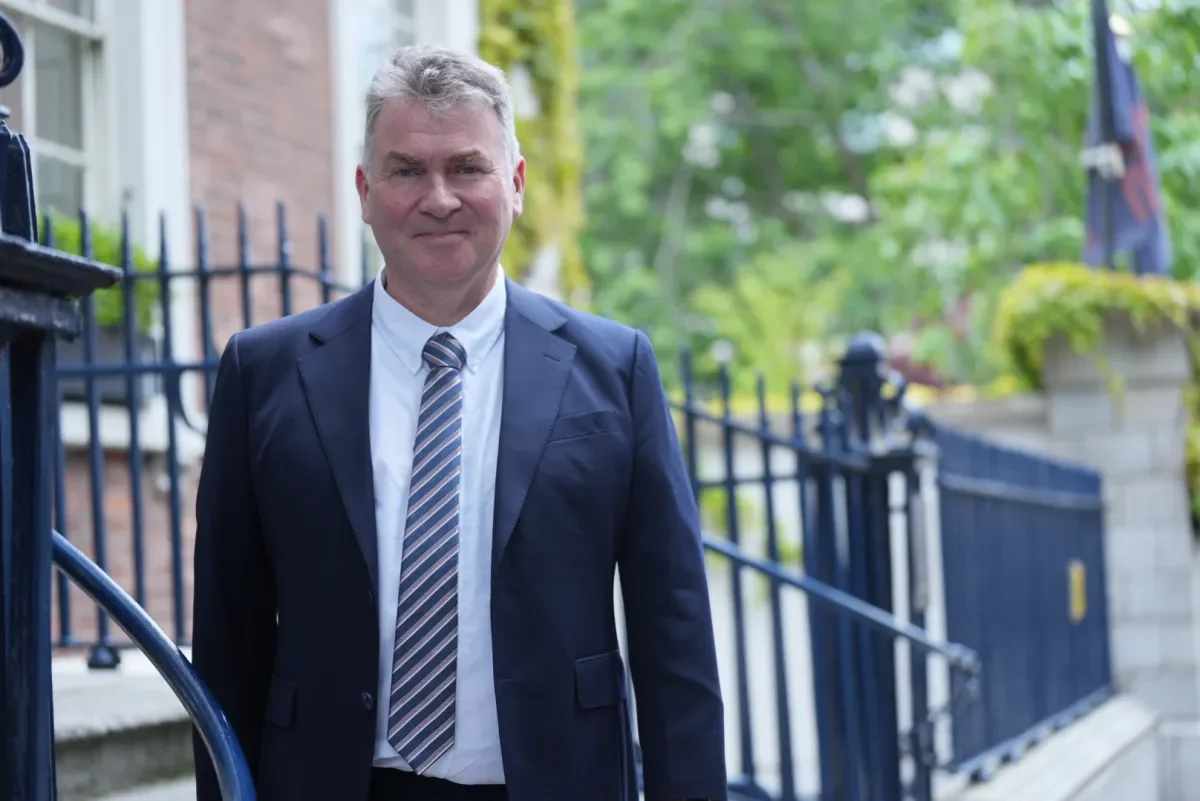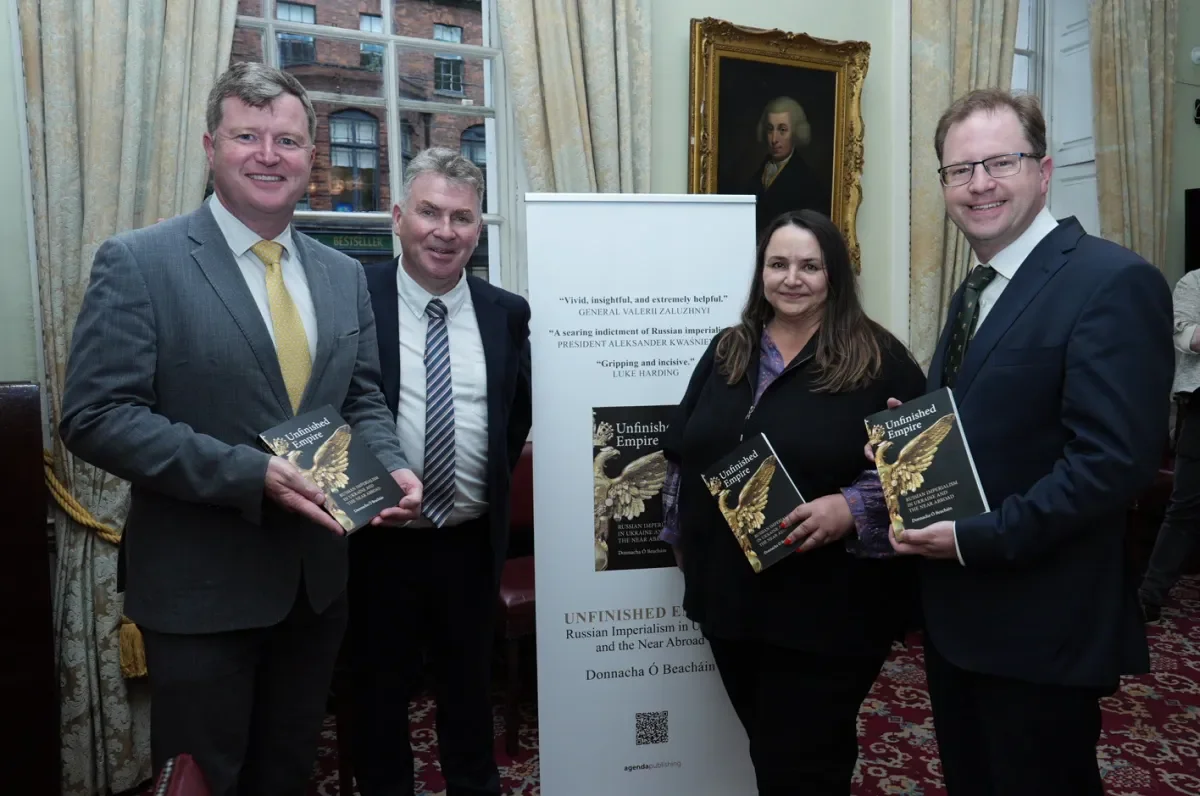

The roots of the Ukraine Conflict lie in Russia’s ‘Unfinished Empire’
Russia’s full-scale invasion of Ukraine in 2022 sent shockwaves around the world, upending the norms and assumptions that had helped to maintain peace in Europe since the end of World War II. But for DCU’s Prof Donnacha Ó Beacháin, Putin’s unprovoked assault on a neighbouring country did not come as a surprise.
“The war isn’t an aberration,” he says. “It’s a continuation of a long historical pattern.”
In his new book, Unfinished Empire, he lays out the historical background as well as current geopolitics that explain the rationale for Russia’s actions and provide the context for Putin’s “special military operation” in Ukraine.
The book was launched in the Royal Irish Academy in Dublin by Minister Thomas Byrne.
Prof Ó Beacháin has been teaching on the topic of post-Soviet politics in DCU’s School of Law and Government for twenty years. Particularly since Russia’s invasion of Ukraine, his expertise has been in demand as a contributor on news and current affairs programmes.
His new book draws on a quarter century of scholarship examining former Russian territories, which, like Ukraine, gained independence with the collapse of the USSR. Key to his research was a decade spent living in Georgia, Moldova, Uzbekistan and Kazakhstan, experiencing life in Russia’s former colonies.
“Coming from Ireland, you have that perspective anyway,” says Prof Ó Beacháin of his time in those countries. “You're acutely aware of imperial powers and the fate of their smaller neighbours.”
Unfinished Empire outlines how the Russia we know today was the result of five centuries of expansion. The 15th-century Duchy of Moscow was roughly the size of modern Albania. By 1917, Russia had become the world’s largest state, stretching from the Baltic to the Pacific. As the author puts it, the empire expanded over the centuries at an average rate of “80 square kilometres a day”.
As the empire’s territories expanded, a process of “Russification” ensued. Prof Ó Beacháin sums this up as the “erasure of national identities, the silencing of languages, rewriting of histories”, with the aim of subjugating newly conquered populations.
Revolution and the fall of the Tsar did not bring Russia’s colonial ambitions to an end, says Prof Ó Beacháin. While the Soviet Union was “ostentatiously anti-imperial”, this did not stop it from invading its neighbours in the name of “liberation”.
“So they ‘liberated’ you, but then you became an involuntary member of the Soviet Union, as the Estonians or the Latvians or the Lithuanians will tell you.”

Prof Ó Beacháin argues that Russia’s expansionist philosophy has never gone away. “Russian imperialism didn’t end with the Soviet Union. It’s taken on new forms and Ukraine is the new front line.”
So, why is the Kremlin so obsessed with conquest and regaining territories it once controlled? In Unfinished Empire, the author argues that Russia differs from other former colonial powers in that it was “a land empire”. He says that countries like Spain, France and Britain, whose colonies were overseas, found it easier to give them up “without much of a psychological loss”.
However, for Russia, the loss of its former territories, which were considered very much part of “the motherland”, was a much bigger blow. “What makes Russia different is that it doesn't see this [empire] as in the past. It wants to regain the territories that it lost.”
Prof Ó Beacháin adds that Russia has long had a “messianic” belief that it is bringing civilisation to “less favoured peoples”, combined with an “old-fashioned territorial notion that it has to expand.”
“Events have illustrated the fact that Russia has no sense of its national borders. I think that makes it unique in the modern world. It doesn't have a sense of where it ends.”
When it comes to Ukraine, Prof Ó Beacháin says Russian President Vladimir Putin has had his eyes on the country for many years. In 2008, at a NATO summit in Bucharest, Putin reportedly told assembled leaders that Ukraine was “completely artificial”. At the time, “people didn’t know whether he was joking,” says Prof Ó Beacháin. “But he wasn’t.”
That denial of Ukrainian nationhood has even become part of Russian education. School textbooks describe Ukraine as “a fake nation” whose people are really Russians.
So, what hope is there for peace? Prof Ó Beacháin says that without a Russian defeat, it is unlikely. “It’s like asking if Nazi Germany could have had a stable relationship with Poland in 1939.”
In Unfinished Empire, he argues that a lack of political will among Ukraine’s allies means it hasn’t received the support it needs to beat the Russians. He points out that North Korea has supplied Russia with more ammunition than the EU has given Ukraine.
Meanwhile, Prof Ó Beacháin says the Kremlin’s long-held obsession with clawing back former colonies is self-defeating and harmful. The country is “trapped in an abusive cycle of authoritarian collapse and resurrection,” he says.
Still, he does not give in to despair. In 1989, a few months before the fall of the Berlin Wall, he visited East Germany and met leaders of the regime as they celebrated its 40th anniversary. “They thought this was going to last forever. They were so confident in the security of their dictatorship,” he recalls.
Prof Ó Beacháin says we can’t rule out a similar fate for the Putin regime. “These types of regimes come down very suddenly. So when I say that the Kremlin regime has to end before there's any kind of durable peace, that may sound a little bit far-fetched. But it seemed very far-fetched in 1989.”
Unfinished Empire is available now.
